The following post features portions of an interview with Michael Evans and Sophie Pacyna of 321 Coffee. Some quotes have been lightly edited for clarity and flow.
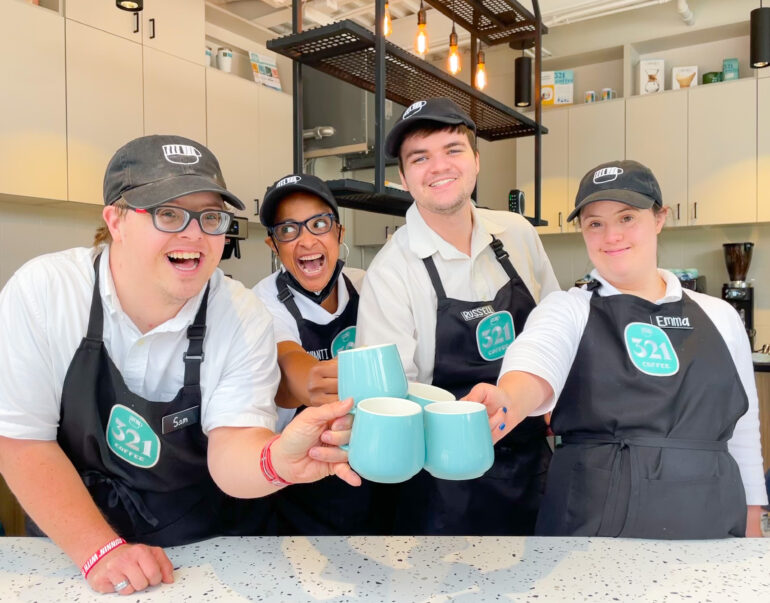
Accessibility in the Coffee Industry
Introducing 321
Throughout the third-wave coffee movement, there are a few hot topics that specialty coffee professionals have put their stock in: sustainability, accountability, origin tracing, fair trade, inclusivity. While it’s not uncommon to hear about accessibility in the coffee industry, most articles on the subject are using a class or culture definition of accessibility. The discussion is about lessening specialty coffee’s exclusivity and “snobbery.”
When 321 Coffee discusses accessibility, however, they’re using a much different context, one with far-reaching implications for American business practices and social programs.
321 Coffee highlights industry accessibility for people with disabilities.
In an industry that relies significantly on both physical and skilled labor, the barricades for individuals with disabilities can feel especially daunting. Lindsay Wrege and Michael Evans set out to change that.
A Primer on US Employment for People with Disabilities
Globally, the World Health Organization states that 1.3 billion people – about 16% of the world’s population – live with significant disability. These disabilities can include any number of conditions including blindness, D/deafness, mental illness, spinal cord injury, degenerative disorders, autism, and illnesses like cancer or HIV.
While many communities throughout the world do not offer significant social support for individuals with disabilities, the United States of America is especially notorious for offering few protections or support systems for people with disabilities despite the country’s wealth. Although the federal government passed the Americans with Disabilities Act (ADA) in 1990 to prohibit discrimination based on disability, numerous loopholes continue to exist.
One such loophole frequently used in corporate America is that a company will provide “reasonable accommodation.” The business is typically allowed to determine whether requested accommodations would provide “undue hardship” for the company. This determination process is supposed to be performed in good faith, but frankly this isn’t always the case.
The Fair Labor Standards Act (FLSA) also allows employers to pay individuals whose “earning or productive capacity is impaired by a physical or mental disability” a subminimum wage. This means that individuals with disabilities can legally be paid less than the federal minimum wage of $7.25 per hour for their work. Sometimes they’re paid as little as $3.00 or less per hour.
For individuals with Intellectual and Developmental Disabilities (IDD), employment opportunities can be especially bleak.
Understanding Intellectual and Developmental Disability
IDD is an umbrella term for a wide range of intellectual and developmental disabilities. Such disabilities can include Down syndrome, cerebral palsy, autism spectrum disorder, fetal alcohol syndrome, pituitary disorders, and certain birth defects like spina bifida.
People with such disabilities frequently need accommodation to live and work independently but are fully capable of doing so if those accommodations are made.
The rub is that many employers are unwilling to make those accommodations, either out of financial concern or misplaced social stigma. They believe people with IDD are incapable of performing certain types of work, therefore they do not hire or accommodate people with IDD for those roles.
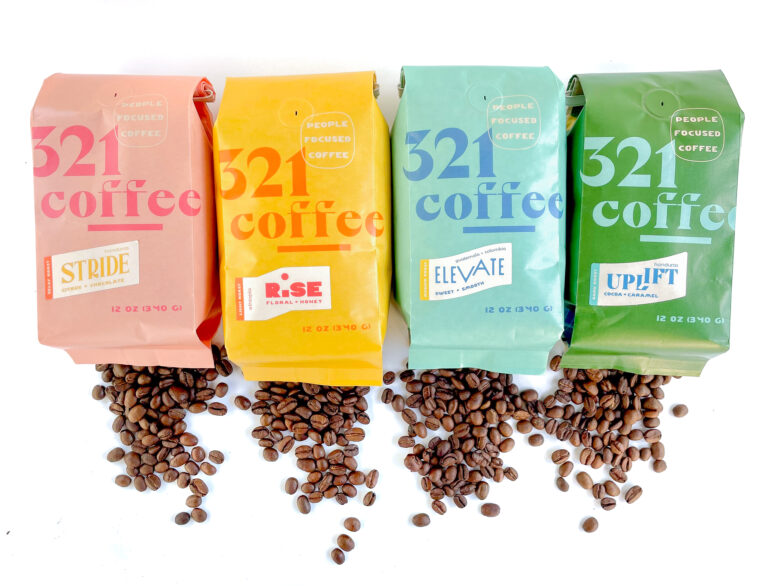
Starting an Accessible Coffee Company
Growing Up in Raleigh
As a child, 321 Coffee co-founder Lindsay Wrege grew up in the Raleigh, North Carolina area alongside several friends with different disabilities. The group went through school together from grammar school all the way through high school, but when Lindsay was preparing to move on to college, she noticed that her friends weren’t doing the same. Not because they didn’t want to, but because they didn’t have the same opportunities available to them that she had.
It wasn’t only school. She came to understand that in professional settings, people with disabilities simply weren’t given the opportunity to find and maintain fair, meaningful employment. While no human being’s worth should be tied to their level of productivity, people should also have the means to support themselves if they would like to work.
All too frequently, however, any offered work for individuals with IDD typically entails menial labor, simplistic tasks, and existing on the peripheral for very low pay. Lindsay recalls an early experience where she was talking to a good friend about how proud Lindsay was of her friend’s dedication to her job, and her friend responded, “Thanks, but I just clean the bathrooms.”
At only 18 years old, Lindsay knew that something had to change, and when the change isn’t happening quickly enough, it’s time to take matters into your own hands. That’s exactly what she did.
Found Family at NC State University
During her freshman year at North Carolina State University, Lindsay met Michael Evans through a group of students that were all part of the same scholarship program. Michael also grew up frequently exposed to people with disabilities due to his mother’s work as a special education professional. Along with the other students, the pair frequently talked about the ways they wanted to change the world.
Lindsay’s desire to start a business or program that could provide meaningful work to people with IDD was a regular topic of conversation. Michael and other members of the group took interest and together they thought, well, if we have this idea, why don’t we do something about it?
The first iteration of 321 Coffee was born in 2017.
A Nod to Chromosome Mapping
When they were deciding on a name for their fledgling business, Lindsay and Michael wanted something impactful that conveyed their mission. They decided on 321 not only because it was catchy, but because it had a message behind it.
Individuals with Down syndrome have an extra chromosome – a third copy of the 21st chromosome, specifically. This is why the disability is also referred to as “Trisomy 21.” This chromosomal copy is responsible for the presentation we typically recognize as Down syndrome – the characteristic facial structure, lower muscle density and tone, delayed speech, and numerous other features.
That’s how 321 Coffee came about. Michael says, “Throughout our brand, we use a lot of elements inspired by that. On our bags and in some of our shops, we have a graphic that’s inspired by DNA or chromosome mapping and represents the uniqueness and value that everybody brings to the company.”
He also points out that while Down syndrome is one of the most immediately recognizable types of intellectual and developmental disabilities, they didn’t set only to only employ individuals with Down syndrome. They work with people who have a variety of disabilities.
Launching 321 Coffee and Championing Accessibility
In the beginning, Lindsay and Michael had to think of a way to start a business on a shoestring college student budget. They always knew they wanted to offer employment opportunities for people with IDD, now they had to figure out how they would provide those opportunities.
They started out providing coffee service at any event that would have them. They would buy pre-brewed Starbucks coffee and have their crew serve cups at events around the NC State campus or offsite. Several of their first employees were childhood friends of Lindsay’s, including Grace Chalker and Emma Wissink. Both women still work with the company today.
“It really sort of naturally grew from there,” Michael says. From their event service, they expanded to a stall at their local farmer’s market serving specialty coffees.
Then, as many recent startup stories go, the Covid-19 pandemic hit hard.
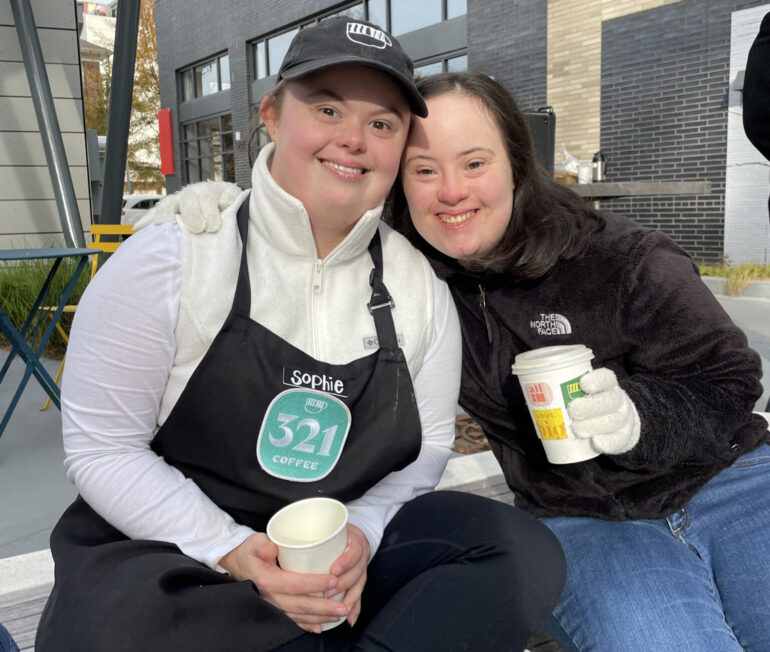
Coffee Industry Challenges
Surviving Through Covid
Like many new businesses, 321 Coffee had to quickly pivot to survive the pandemic. Unlike other businesses, they had unique problems to solve.
“We were working with a population that typically is more immunocompromised than the rest of the population, so we were very careful about how we were going back to work,” Michael says. “We were probably a little slower than other companies in our area at adopting certain things, but I think it also pushed us to grow in really cool ways.”
Certain types of IDD, like Down syndrome and cerebral palsy, are tied to specific health risks and people with these disabilities are not only immunocompromised, they’re also at higher risk of complications if they catch certain diseases, especially viruses like Covid-19. With the entire premise of their business built around employing immunocompromised people, they had to come up with other solutions.
Expanding to a Coffee Shop and Roastery
They decided to pivot from serving outside coffee to roasting their own.
“I remember early on in the pandemic, we thought okay, what if no one ever goes back to coffee shops again?” Michael says. “At that point, we were like, well, if no one ever goes back to coffee shops, we can still provide work opportunities by roasting coffee and sending coffee to people’s homes.”
They bought a Sonofresco 2lb roaster, set it up at the farmer’s market, and started roasting their own coffee from their little stall. Much like Naysayer Coffee Roasters, who we highlighted in another post, this pivot not only saved their business, it gave them room to grow.
From a modest stall at the farmer’s market, Lindsay and Michael were able to open their flagship café where they could officially train their staff as baristas and roasters. The staff grew from a small handful of dedicated servers to a robust coffeehouse operation.
In a few years’ time, they found a home among the Raleigh-Durham community, who supported 321 Coffee wholeheartedly. With every cup of coffee served and sold, they were able to hire more staff and expand to two additional shop locations and their own roastery. Today, they employ over 50 people with IDD between their locations, including Grace and Emma.
“Emma is an awesome barista,” Michael says. “She actually came out with us to [the Specialty Coffee Expo] and she was working the Oatly booth for most of SCA.”
Inclusion and Diversity are More Than Buzzwords
In corporate America, the words “inclusion” and “diversity” are frequently bandied about for optics without much concrete action behind them. While many major corporations pay lip service to diverse recruiting and hiring, 321 Coffee made it their core mission to specifically hire across the lines of race, gender, and disability.
It’s important to Lindsay and Michael that they’re not hiring people with disabilities only to keep them out of the public eye. Their employees are the literal face of their business, always behind the counter in customer service roles. They’re the people at the register, pulling the espresso, blending the drinks, roasting the coffee, and serving it with a smile.
This is never more apparent than when you buy a bag of 321 Coffee and turn it over to see the artwork on the back: portraits of real, named employees.
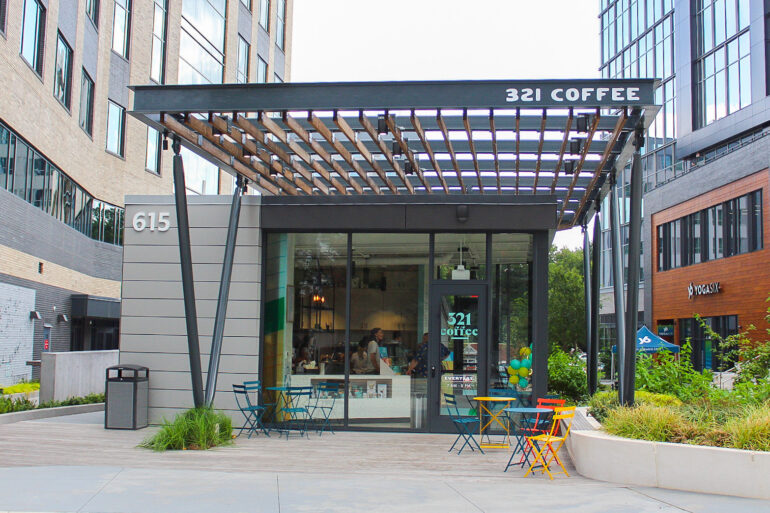
Improving Accessibility in the Coffee Industry
Creating Opportunities
One of the largest barriers for many people with disabilities when entering the workforce is the lack of accommodations required to do their job. Lindsay and Michael made an active effort from the very start to ensure their employees had the tools and training they’d need to complete their work.
This isn’t always an easy task, but it’s a necessary one. Michael says, “[I think] perfect is the enemy of good, or the enemy of making an effort at all. So, we always try.”
When considering how to improve their own level of accessibility, he says, “It’s constant innovation. It’s constantly looking at processes and thinking hey, how can we make these processes better?” He adds, “I think it’s listening to staff and making sure that you’re asking the right questions. We’re always trying to ask our staff and make sure that the tools that we’re giving people are the right tools, and that people are understanding what they need to be doing.”
Choosing the Right Tools
Have you ever watched an infomercial and thought, “Wow, this is a product for lazy people?” If you have, you’re not alone. However, there’s another way to think about it: most of those products were originally invented for people with disabilities.
Consider for a moment if you were unable to bend down to tie your shoe or pull on a sock. You’d need a tool to help perform the task. In a conversation about accessibility, these are the types of tools that must be considered to help a person with a disability complete their work.
In the specialty coffee industry, certain technology is sometimes considered an “inferior” way to achieve a goal. Using automated roast profiles instead of roasting manually, for example, or even tamping espresso with an automated press instead of doing so by hand. However, these are the very tools that help 321 Coffee’s staff do their job well.
Michael says, “[An espresso puck press is] a great accessibility feature because we found with our staff, trying to tamp espresso is a very difficult skill, especially if you’re someone who has lower muscle density or [you’re] trying to get enough height on your tamp to put enough pressure down on it.” Because many individuals with IDD have comorbidities, or simultaneous conditions, they may have low muscle tone or be shorter than the average adult. They can perform the task; they only need some help.
Coffee Roasting Accessibility
Sophie Pacyna, a woman with Down syndrome, is one of 321 Coffee’s roasters. She roasts coffee on Tuesdays using a Loring S15 Falcon. She loves working with 321.
“It’s an amazing, fun environment, and I just love the word ‘inclusion,’” Sophie says. “It means a lot to me because I love my 321 family and I want the world to see how great we are.”
She’s been roasting for 321 Coffee for a while, even before they moved into their own facility with their own roaster. While Loring’s automation features are very useful for her and especially her coworker Paul, Sophie enjoys roasting manually. There are other features on the Loring that have made her job more accessible, as well.
Before using the Loring, Michael recalls how he’d have to climb up and down a ladder with 25-pound buckets of green coffee beans to load them into the hopper. The task was dangerous for some of the staff who couldn’t lift that much weight overhead easily.
Sophie says, “Basically, at the old roasting facility, we had to lay out the coffee in big buckets by dumping it in the coffee roaster. So, how we made it more accessible is […] we use a vacuum that suctions out the coffee that will load it into the green hopper.” She also mentions how Michael used to have to help with the lifting and adds, “Now I can do it all by myself and I’m so proud of myself.”
The green bean vacuum feature of Loring roasters was originally intended to expedite the process of loading beans into the hopper and, like many technological advances, turns out to have the additional benefit of providing support for workers with disabilities so they can do their job independently.
“Now there are many things I can do myself,” Sophie says. “I can actually see the monitors and the tablets, too, because the monitor is large so I can see the reference card. I can use the tablets that remind me what to do and I love the touchscreens and videos that it shows.”
Michael notes that the timing features on the Loring are also helpful because they send signals that alert workers when one part of the roast is finished and it’s time to move on to the next step. The ability to adjust the automatic timers associated with the mixer and cooling fan have made their workflow much easier to follow.
Encouraging Independence
One of 321 Coffee’s first employees was Sam Hening, a server-turned-barista. He’s become something of a brand staple and is one of their most recognizable figureheads.
In the early days, Sam joined Lindsay and Michael on the NC State campus to serve coffee to the football team during the season. Every Monday morning, Sam commuted to Raleigh from Rocky Mount, about an hour away. It wasn’t easy, but he loved working with the football team so much that he made it a priority.
Over time, Sam grew more confident and decided to make a move to increase his independence.
“I’d say that opportunity was a big catalyst for Sam to move in on his own in Raleigh and really start laying down his own roots and finding his own jobs,” Michael says.
“[It’s] a really cool full-circle moment to not only celebrate the roots of 321 Coffee and that we started at NC State between Lindsay and I, but also to celebrate that story of Sam because of so much that came for Sam and honestly what has come for everyone else because of Sam and his relationship with NC State football.”
Michael asks Sophie if there’s anything she’d like to add and she responds brightly, “Yeah! Sam Hening is actually my boyfriend.”
“Coming up on three years, right?” Michael says.
“Yeah,” Sophie says.
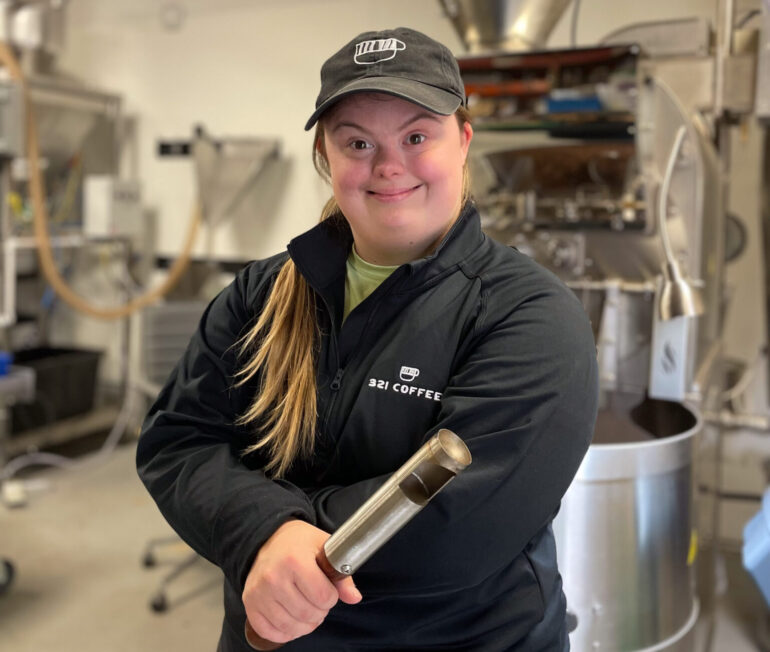
Building a Better Coffee Business
Championing the Greater Good
One day while Lindsay and Michael were still students at the university and getting 321 Coffee off the ground, they received a phone call from Sara Doeren. Her husband, Dave Doeren, is the head coach for the NC State football team and they’d both seen 321 serving coffee at events.
On that call, Sara said, “I think what you guys are doing is really cool. We’d love for NC State football to be a part of this. What can we do together?”
The Doerens have always been proponents of empowering a range of students, including those with disabilities. Earlier this year, they gifted over a million dollars to NC State to establish a program specifically to support students with executive functioning disorders or who are otherwise neurodivergent.
Sara Doeren’s interest was the catalyst for 321 to begin serving coffee to the football team and at football-related events. Barista Sam found a home among them and now splits his work schedule between both his barista duties and a position with the football team, which he loves.
To make the relationship official, 321 Coffee teamed up with NC State to release a special Greater Good coffee that features Sam’s portrait on the back of the bag alongside the NC State mascot. Everyone involved wanted Sam to know how integral he is to both the school and the business.
Featuring employees on the coffee bags has always been important to the 321 team. Sophie herself can be found on the bags of coffee she roasts. She enjoys it when customers ask her to sign the bag.
“Everyone loves a good autograph on the back of their coffee,” Sophie says. “They love a dark roast, a medium, a light, whatever, I’ll sign it for them.”
Diversity and Accessibility Makes Businesses Stronger
At the time of this posting, 321 Coffee has existed for more than five years. In that time, the business has grown from a small serving table to a full-fledged roastery and coffee shop operation with four locations. The waiting list for a position at the company continues to expand.
Michael attributes their success to their local community. “So many people bought into this,” Michael says. “We got to see the Raleigh community come together and celebrate [this], and that was a really cool moment.”
He also takes the opportunity to brag on Sophie. “Sophie has become an excellent coffee roaster,” he says. “Really knows her stuff and is proud of the product she’s putting out and proud of the way that she’s able to talk about it.”
Growing any business comes with challenges and learning opportunities, and 321 Coffee was no exception. Overall, though, they’ve received resounding support.
“We definitely think of success in terms of the number of people that we’re able to impact,” Michael says. “For us, the success of being able to open a new shop is really a success because that’s more people we’re able to provide work to and hopefully impact their lives in a really positive way.”
If there were ever a case study to illustrate building a thriving community and business based on the concept of diversifying the workforce and setting employees up for success, 321 Coffee is it.
What the Future Holds for Accessibility in the Coffee Industry
The 321 Coffee journey is still in its early days and Michael and Sophie feel very optimistic about the company’s future. Now that they’ve increased production and opened their own roastery, they hope to move more into retail very soon.
“It’s something that our team talks about a lot, just that piece of representation does matter,” Michael says. “To have 321 Coffee on the shelf of a grocery store is more than just coffee being on the shelf, it’s representation being on the shelf. It’s someone being able to walk into a grocery store and say hey, that person looks like me.”
Sophie agrees. “I think I would love to be in grocery stores and a bunch of other places, too.”
Coffee isn’t the only thing in Sophie’s future, either. She’s loved learning the craft of roasting and hopes to apply the skills she’s learned to open her own business one day.
“I want to open my own brunch place,” she says. “I love to cook.”
With the support of 321 Coffee and the skills it imparts, that future looks very bright.